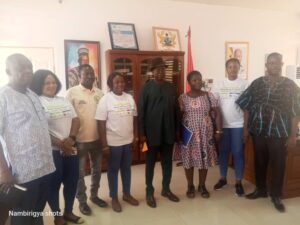By Samuel SAM
The government has outlined plans to revitalise stalled development projects in the Upper East Region as part of efforts to stimulate economic growth and improve the living standards of residents.
The initiative will focus on critical areas, including the construction of irrigational infrastructure at Pwalugu, restoration of peace in Bawku, rehabilitation of defunct factories, construction of an airport, and road improvement works across the region.
According to the Upper East Regional Minister Akamugri Donatus Atanga, the comprehensive development agenda is expected to create jobs, improve access to essential services and boost local businesses.
He made these remarks during a courtesy call by the leadership of the Northern Patriots in Research and Advocacy (NORPRA), a youth advocacy group based in Bolgatanga.
During the visit, NORPRA congratulated the minister on his vision for regional development and used the opportunity to share findings from their assessments of government initiatives such as the One Village One Dam (1V1D) policy and the Free Senior High School (FSHS) programme in Northern Ghana.
Mr. Atanga acknowledged the group’s advocacy efforts and affirmed the government’s commitment to ensuring accountability and transparency in the use of public funds. He reiterated President Mahama’s stance on ensuring value for money in all government expenditures.
He further noted that the severity of poverty in Northern Ghana requires significant public investment to address historic development disparities, stating that the Northern Development Authority (NDA) will play a key role in driving this transformation.
He also assured that government remains committed to supporting women and other vulnerable groups in improving their livelihoods.
NORPRA Executive Director, Bismark Ayorogo, presented a critical review of the 1V1D initiative, describing it as a drain on the public purse.
“Our assessment revealed that none of the over 400 dams constructed holds water to support dry-season farming as intended, undermining the policy’s goal of enhancing agricultural productivity, food security and job creation,” he said.
Mr. Ayorogo also pointed to procurement irregularities under the FSHS programme, estimating that over GH¢47million was lost nationwide, with more than GH¢10million lost in Northern Ghana between 2017 and 2023.
He called on government to demand accountability from those involved in the 1V1D implementation and to investigate perceived corruption in the FSHS programme, stressing the need for decisive action to uphold public trust and ensure value for money in pro-poor policies.
Looking ahead, NORPRA urged government to prioritise public investment in renewable energy, including the construction of durable dams and solar-powered mechanised boreholes, as part of an agricultural-led transformation strategy for Northern Ghana.
“This would empower women in agriculture and contribute to achieving the objectives of the upcoming Coordinated Programme of Economic and Social Development Policies (CPESDP 2026–2030),” Mr. Ayorogo noted.
He added that prioritising renewable energy aligns with Ghana’s commitments under the Paris Agreement and the country’s updated Nationally Determined Contributions (NDCs), which call for over US$6million in investment to build resilience and improve livelihoods in climate-vulnerable areas.
He also highlighted the relevance of the Renewable Energy Act, 2011 (Act 832) and the National Energy Transition Framework, urging government to increase investments to diversify the energy mix and reduce dependence on fossil fuels.

Mr. Ayorogo further informed the minister that NORPRA, in partnership with the Northern Savannah Women Enterprise (NORSWE), has supported 600 women across five districts in the region to establish a well-equipped agro-processing centre in Bolgatanga.
The women, trained by the CSIR-Food Research Institute, now produce high-quality agro-products, including groundnut paste, oil, soymilk, weanimix and soya sausage for both local and international markets.
“NORPRA and NORSWE are ready to take advantage of the government’s agro-processing and industrialisation initiatives under the 24-hour economy policy to contribute to job creation and economic development,” he stated.










